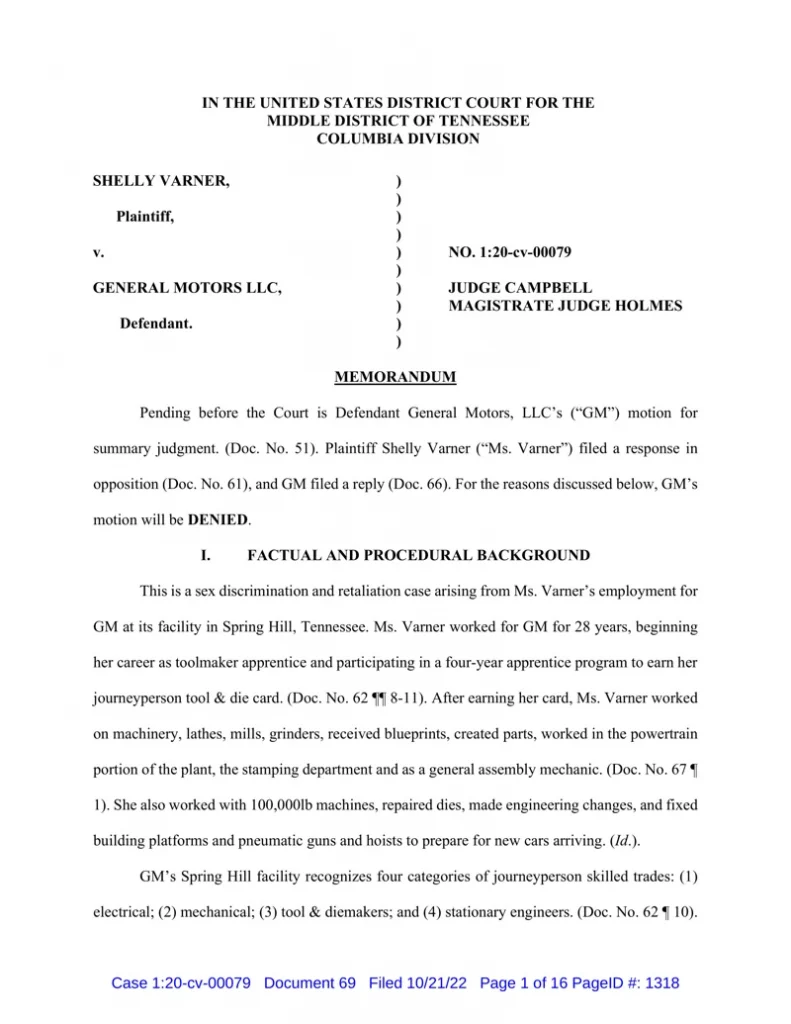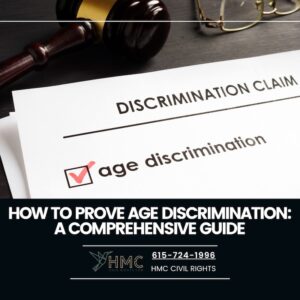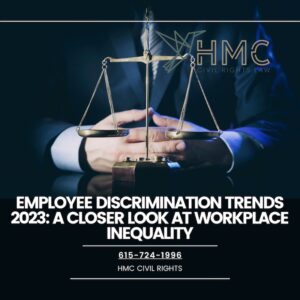HMC Civil Rights is proud to announce the successful ruling for our client, Ms. Varner, against General Motors in a case of sex discrimination. The facts of the case showed that on multiple occasions, Ms. Varner was denied job opportunities because of her gender while positions opened up and were filled with male counterparts.
The outcome of this case marks an important milestone as it recognizes that discrimination based on gender is illegal and sets a precedent for future employment discrimination cases. The ruling reinforces existing laws, such as Title VII of the Civil Rights Act, which prohibits employers from discriminating against employees or applicants based on sex.
The court’s ruling also has important implications for plaintiffs and defendants in future employment discrimination cases. The ruling clearly identifies the steps for determining a valid claim. For defendants, it reinforces the need to provide legitimate, non-discriminatory reasons for any decisions regarding employee hiring or termination.
View some of our other notable cases to learn why we are the preferred civil rights firm in Nashville, TN. We look forward to fighting for justice on your behalf.
The verdict, in this case, has significant implications for not only Ms. Varner but also those who have experienced similar injustices. This case sets an example that will empower future litigants to stand up for their rights and be vigilant in the fight against workplace discrimination.

Read more about the case (PDF opens in new window)
Case Summary
GM submitted a motion for summary judgment to the court to dismiss our case due to the facts they found during their investigation.
We obviously filed an opposition against this. The judge ruled that GM had not given a good enough reason as to why our client was denied the promotion, and because of this, he denied GM’s motion. This means we are now going to trial.
Heather’s comment on the ruling:

“This was an interesting and accurate opinion in that it points out the tension with the McDonnell/Douglas burden-shifting analysis that is used in employment cases and the Rule 56 standard. Rule 56 puts the burden squarely on the moving party’s shoulders and requires all factual inferences to be drawn in the non-movant’s favor.
Yet, under the McDonnell Douglas paradigm, the Rule 56 standard gets lost. Oftentimes merely because a motion is filed, even if a defendant fails to meet its burden and produce evidence demonstrating an absence of material fact, the burden is often presumed to have shifted to the plaintiff, with only cursory mention of the “legitimate non-discriminatory reason” that allegedly justified a discriminatory or retaliatory action, when as a technical matter it has not.
Nonetheless, plaintiffs in employment cases are left with the steep uphill climb to argue pretext, essentially changing entirely Rule 56’s standard of review. In this opinion, the court rightly pointed out that the defendant failed to meet their burden under Rule 56. If more courts adhered to Rule 56 in a stricter sense in employment cases by simply denying the motion when a defendant has failed to meet their burden as the moving party,
I truly think the courts would be less burdened with the proliferation of unnecessary Rule 56 motion practice.
Ms. Varner is pleased to be able to present her case to a jury of her peers.”
Why This Matters
This case is an important win for plaintiffs in employment discrimination cases. It reaffirms the McDonnell Douglas burden-shifting analysis, which can be challenging to navigate for those who are not familiar with it.
The ruling also underscores the importance of adhering to Rule 56 standards in these types of cases. As Ms. Collins notes, if more courts adopted a stricter interpretation of Rule 56, fewer unnecessary motions would be filed in employment discrimination lawsuits. This would lead to fewer delays in the process and a greater level of justice for plaintiffs.
Employers need to understand that if they fail to meet their burden, as GM did in this case, they may not escape liability through pre-trial motions. If businesses are found liable, they must remember that there are consequences for their actions. These consequences may include financial damages, changes to company practices, or both.
Overall, the ruling, in this case, reaffirms the importance of adhering to the burden-shifting analysis used in employment discrimination cases and serves as a reminder for employers that they must be held accountable if they fail to meet their burden.
At HMC Civil Rights, we are dedicated to protecting and defending our clients’ rights so they can achieve justice. We are proud of Ms. Varner’s courage in standing up for her rights and of the successful outcome of this case.
We hope it will serve as an example to other employers that workplace discrimination is illegal and intolerable. We are committed to continuing our fight against workplace discrimination and look forward to helping more clients seek justice.
If you believe you have been a victim of workplace discrimination, don’t wait to take action. Contact our team at HMC Civil Rights today to learn more about how we can help you fight for your rights.






